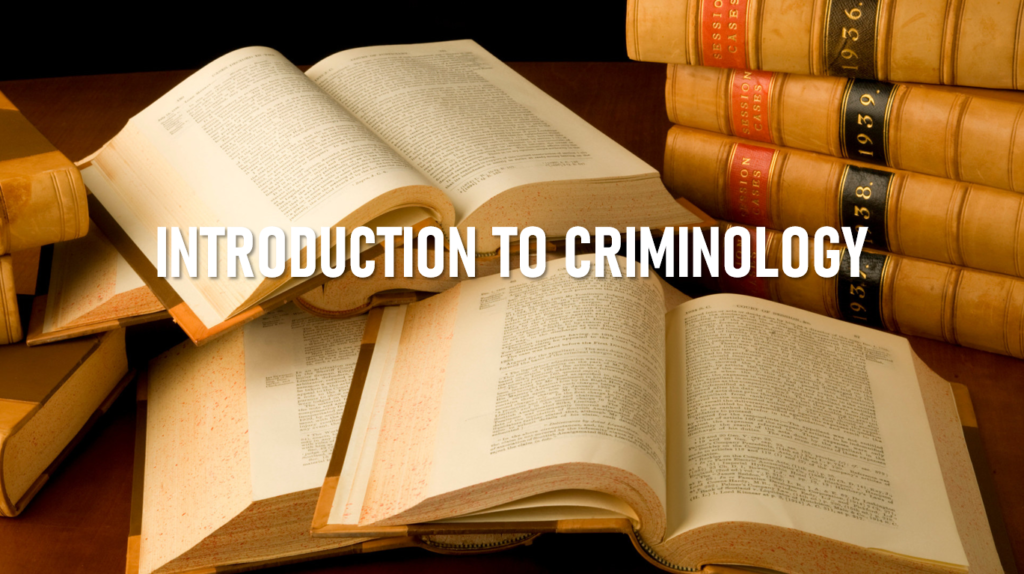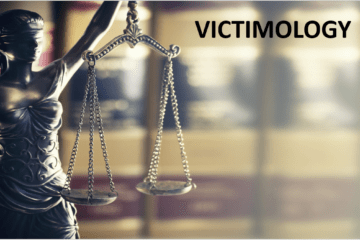INTRODUCTION

There can be no society without the problem of crime or criminals. John Gillin has defined crimes as an act that has been shown to be actually harmful to the society or that is believed to be socially harmful by a group of people that has power to enforce its beliefs and that places such act upon the ban of positive penalties. In simple words, he has considered crime as an offence against the law of the land.
Enrico Ferri, the noted Italian Criminologist once observed that most of the progressive countries today are engaged in safeguarding the interest of their people by adopting a criminal policy which can best protect the society from crime and criminals. The success of eliminating crimes from society, otherwise known as Social Defense largely depends on the efficiency of the criminal law of a particular country. The problem of crime control essentially involves the need for a study of the forces operating behind the incidence of crime and a variety of co-related factors influencing the personality of criminals, and this is where criminology comes into play. Let us understand what criminology deals with and its nature and scope.
WHAT IS CRIMINOLOGY?
The word ‘criminology’ was originated in the year 1890. The word has its origins from two words, Latin word ‘crimen’ which means accusation and the Greek word ‘logia’. Put simply, criminology can be understood as the scientific study of crime as a social phenomenon, as criminals and penal institutions.
Jurist have defined criminology in various different ways, some of the definitions are as –
Coleman and Norris: According to them, criminology is the analysis of nature of crime, perpetrators of crime, the cause of crime, the formulation of criminal laws and law-enforcements and the control of criminal behavior.
Prof. Kenny: He defined criminology as the branch of criminal science which deals with crime causation, analysis and prevention of crime.
Sutherland: He gave a more comprehensive definition of criminology and defined it as the body of knowledge regarding delinquency and crime as a social phenomenon and it includes within it, the process of making laws, breaking laws, and of reacting towards the breaking of laws.
Professor Gillin has rightly stated that it is not the humanity within the criminals, but the criminality within the humans which needs to be curbed through effective administration of criminal justice. This interdisciplinary field of study seeks to discover the cause of criminality and suggests the remedies to reduce the crime. The subject involves scholars and practitioners representing a wide range of behavioral and social sciences as well as numerous natural sciences.
Criminology has played a historically reforming role in relation to criminal laws and the criminal justice system. Its findings have influenced legislators, judges, prosecutors, lawyers, probation officers and prison authorities promoting them to better understand crime and criminals and to develop better sentences and treatment facilities for criminals.
NATURE AND SCOPE OF CRIMINOLOGY
Broadly speaking, criminology deals with the legal psychiatric aspect or medico-psychological, biological, pedological, or sociological aspect of criminality and the factors related therewith, and thus, it seeks to study the phenomenon of criminality in its entirety, i.e., criminology in the broadest sense covers the whole of criminal science, which includes sentencing, punishment, laws, procedure, rehabilitation, crime detection, and the like. Criminology can be further divided in two heads:
- Theoretical or pure criminology; and
- Applied or practical criminology
Prof W.A. Bonger preferred studying theoretical criminology under the following sub-heads:
- Criminal Anthropology – This seeks to understand the personality of the offender in physical terms. Cesare Lombroso was the first to propound this view and he emphasized on explaining criminal behavior in terms of physical characteristics of the offender. According to Lombroso, criminals were in different physical form than normal members of the society and possessed inferior physical characteristics.
- Criminal Sociology – This is based of Sutherland’s differential association theory, which tries explaining criminal behavior as a process of learning through association with other criminals. This theory however, fails to acknowledge the personality traits of psychological variables of criminal behavior.
- Criminal Psychology – It seeks to corelate criminality to emotional aspect of human nature. French psychologist Alferd Binet and Professor Jerman of USA are the main propounders of this view.
- Criminal Psycho-neuro-pathology – Dr.Glueck and Freud were the main exponents of this view. This branch of criminality attributes criminality to functional derivations and mental conflicts in the personality of the offender. The factors such as inferiority complex, frustration, depression, anxiety etc. may lead a person to commit crime.
- Penology – This concerns the various aspects of punishments and penal policies and the various mechanisms of punishing the offenders.
- Victimology – This branch of criminology is fairly new and deals with the victims of crime. It seeks answers the question of why and how do people fall victim to crime and how they can be helped against the abuse of power or criminal acts of the offenders through access to criminal justice. It also outlies the possible ways by which victimization can be prevented against crimes and legal remedies available to the victims.
Applied Criminology, on the other hand, includes the study of criminal hygiene and criminal policy which is founded on solid derivative conclusions.
Apart from this, there is yet another branch of criminology called criminalistics which connotes the police techniques of crime investigation and detection. It provides useful material for study and understanding of criminal justice administration from point of view of field officers whose main pre-occupation is to deal with the law and procedure relating to investigation and prosecution of criminal cases.
IMPORTANCE OF CRIMONOLOGY
The following are the main causes of the study of Criminology:
- The criminology clears the way of study of the social system.
- It suggests the ways of elimination of criminal instincts in the society.
- Criminology tells the ways of bringing stability in human values.
- It tries to reform the criminal
- This system of study becomes helpful to the investigation officer in reaching from the point of crime to the criminal.
- Crime is a necessary evil and an ailment. Criminology suggests the ways and means of checking this evil.
- Criminology tells the effective methods by which the crimes can be controlled so that peace and order may be established in the society.
- The Spirit of social security is created by the study of criminology.
References:
- Gillin J.L. : Criminology & Penalogy.
2. Coleman and Norris: Introducing Criminology.
3. N.V. Paranjape : Criminology & Penology (including victimology)




0 Comments